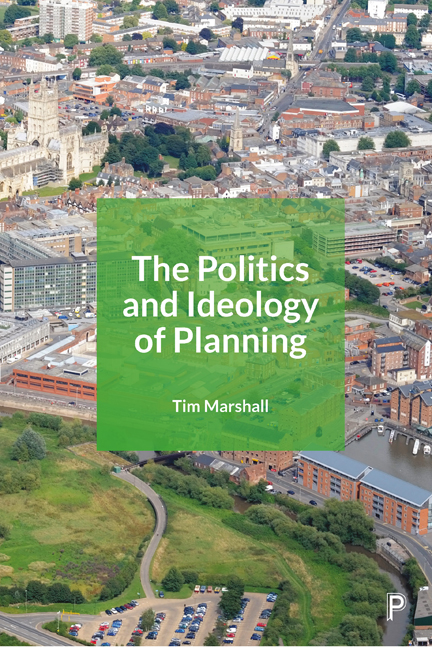Book contents
- Frontmatter
- Contents
- List of figures and tables
- List of abbreviations
- Acknowledgements
- 1 Introducing planning, politics and ideology
- 2 Writing on politics and ideology in planning
- 3 Ideologies in Britain, with initial linking to planning
- 4 Planning history, planning reform and politics and ideology
- 5 Planning expertise and planning law: autonomy from politics and ideology?
- 6 Ideology and politics in government, central and local
- 7 Ideology and politics in professions, lobbying, consultancies and pressure groups
- 8 Communication, the media and deliberation
- 9 Facets of planning action: heritage, local environment and design
- 10 Fields of planning action: housing, economy and infrastructure
- 11 Paths to improving the ideological and political dimensions of planning
- References
- Index
1 - Introducing planning, politics and ideology
Published online by Cambridge University Press: 05 January 2022
- Frontmatter
- Contents
- List of figures and tables
- List of abbreviations
- Acknowledgements
- 1 Introducing planning, politics and ideology
- 2 Writing on politics and ideology in planning
- 3 Ideologies in Britain, with initial linking to planning
- 4 Planning history, planning reform and politics and ideology
- 5 Planning expertise and planning law: autonomy from politics and ideology?
- 6 Ideology and politics in government, central and local
- 7 Ideology and politics in professions, lobbying, consultancies and pressure groups
- 8 Communication, the media and deliberation
- 9 Facets of planning action: heritage, local environment and design
- 10 Fields of planning action: housing, economy and infrastructure
- 11 Paths to improving the ideological and political dimensions of planning
- References
- Index
Summary
In this book, planning refers primarily to the system called town and country planning in the UK. Planning is about guiding the futures of places, deciding the changes affecting these places through development. Some people, including some planners, have thought that this was something which could be done in a broadly technical manner, as a doctor might diagnose and then treat an illness. Many planning students still may hope that this is the case, that they are joining a technically oriented profession. Their training certainly has a partly technical character. But most people will appreciate that planning is about values, which are the subject of eternal disagreement, and that therefore politics comes into the process, from the first moment. This book responds to this tension.
This is a tension which is not limited to planning. Other professions aspire to a non-political and non-ideological role, but, as in planning, those working in, say, schools or universities or the health service know (in varying degrees) that the context of their work is fully political (and they might say ideological), and they are no doubt more aware of this now than in previous eras. It is possible to bury this reality, or at least take as little notice of it as possible. But I think this is increasingly counterproductive, given the ever-sharpening circumstances facing the UK in the 2020s. The main aim here, therefore, is to open out the nature of planning's implication in ideological and political forces in a new way, so that planners and those associated with planning can be aware of how these forces work. This can help to ensure that planners, while learning and practising, have increased awareness of their situations when dealing with the challenges in which they find themselves. This introductory chapter lays out the problems that planning has with political and ideological questions, and discusses the ways that thinking about politics and ideology may help.
The relationship of planning and politics
Planning and politics have never been easy bedfellows. Planning has always had problems with thinking about its insertion in ideological forces and in both long-term and everyday politics.
- Type
- Chapter
- Information
- The Politics and Ideology of Planning , pp. 1 - 24Publisher: Bristol University PressPrint publication year: 2020



